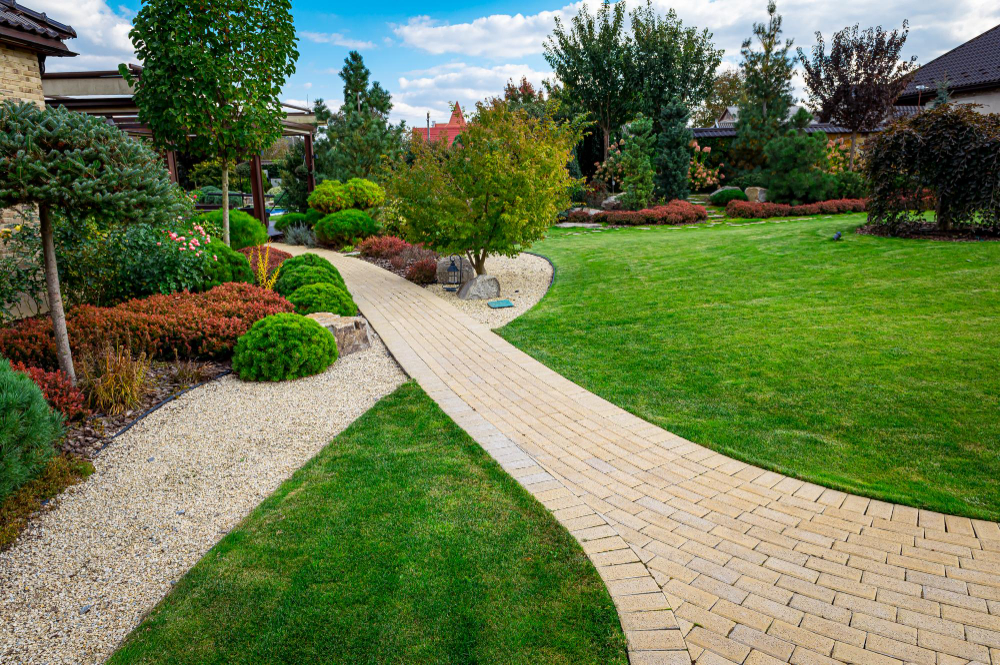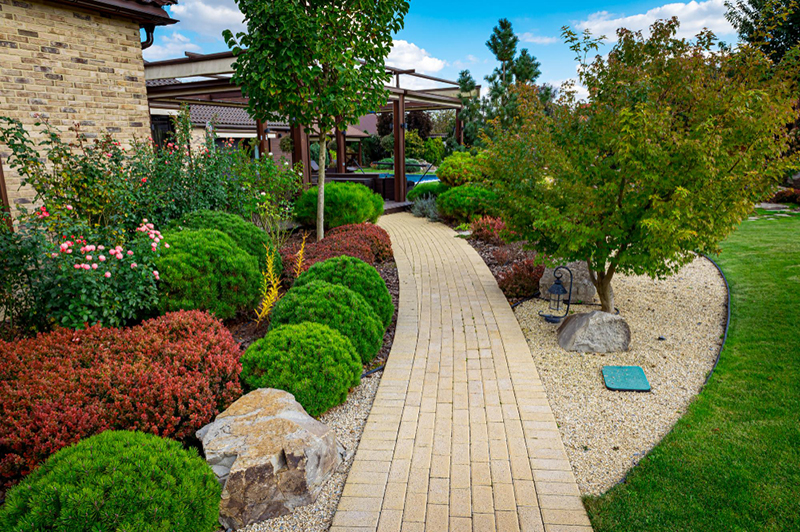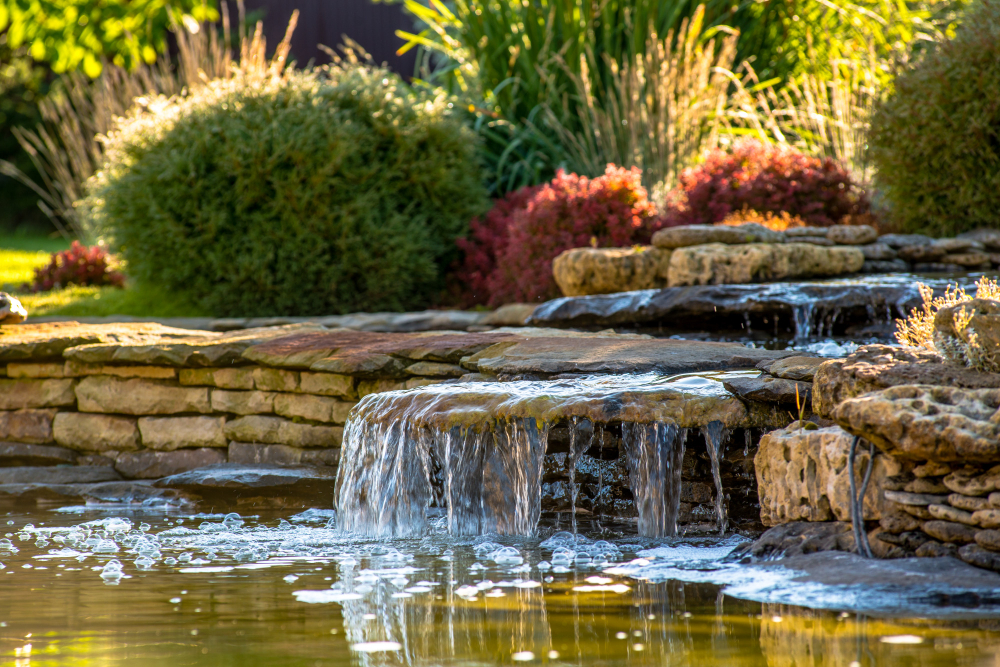The art of Japanese garden design stands as a beacon of tranquility and aesthetic perfection, harmonizing the natural elements with human creativity. This unique form of landscape art transforms ordinary spaces into serene havens, where every detail contributes to an atmosphere of harmony and balance. We will delve into the intricacies of this landscaping art form. We’ll explore how landscapers incorporate principles of Japanese gardening into both residential landscaping and commercial landscaping. We’ll talk about creating spaces that transcend the ordinary and invite contemplation.
Foundations of Japanese Garden Design
Japanese garden design roots itself in the pursuit of balance and harmony. Landscapers often begin by studying the existing landscape, considering the interplay of light, shadow, and the natural contours of the land. This initial assessment lays the groundwork for a thoughtful design process that respects the inherent beauty of the natural environment. In residential landscaping, this might involve sculpting a peaceful retreat in a backyard, while in commercial landscaping, it could translate into creating a welcoming, serene entrance to a corporate building.
The philosophy behind Japanese gardening emphasizes the importance of replicating the diverse aspects of nature, albeit in a more ordered and stylized manner. Elements such as rocks, water, and plants are not merely decorative features; they symbolize aspects of the natural world, such as mountains, rivers, and forests. Skilled landscapers meticulously arrange these elements to create a miniature landscape that evokes a sense of vastness and natural splendor.
Key Elements in Japanese Garden Design
Rocks and Sand
In the realm of Japanese garden design, rocks and sand form the backbone of many landscapes. Landscapers meticulously select and place rocks to represent mountains and islands, fostering a sense of solidity and permanence. Meanwhile, sand and gravel, often raked into intricate patterns, symbolize water, waves, or even the flow of time itself. This interplay between the static and the dynamic highlights the landscaper’s ability to capture the essence of nature in a tangible form.
Water Features
Water holds a central place in Japanese gardens, embodying life, purity, and renewal. Landscaping services frequently incorporate ponds, streams, or waterfalls to bring movement and sound into the garden, creating a calming atmosphere. In residential landscaping, a small, gently babbling brook can transform a backyard into a sanctuary of peace. In commercial settings, a well-designed waterfall can add a touch of elegance and tranquility, offsetting the hustle and bustle of the business world.
Plants and Trees
Plant selection and placement are pivotal in Japanese garden design, with each species chosen for its aesthetic appeal, seasonal changes, and symbolic meaning. Landscapers often use evergreens to represent enduring life and resilience, while flowering plants like cherry blossoms symbolize the transient beauty of existence. The thoughtful arrangement of plants and trees in relation to other garden elements—such as rocks and water features—enhances the garden’s overall harmony and visual appeal.
Pathways and Bridges
Pathways and bridges serve not only as functional elements in Japanese gardens but also as symbolic journeys. They guide visitors through the landscape, encouraging slow, contemplative movement. Landscapers design these features with care, ensuring that each step reveals a new perspective or detail. Thus this deepening the visitor’s connection to the natural surroundings. In residential landscapes, winding paths can lead one on a personal journey of discovery. While in commercial spaces, they can provide a restful respite from the work environment.
The Role of Minimalism and Asymmetry
Minimalism and asymmetry are two principles central to Japanese garden design, reflecting the natural irregularity and simplicity found in nature. By avoiding symmetry and embracing irregular arrangements, landscapers create gardens that feel more natural and spontaneous. This approach encourages visitors to appreciate the beauty in imperfection and the unexpected. In the context of landscape and design, this philosophy can transform ordinary spaces into unique, memorable environments. Thus these enviroments will stand out from more conventional designs.
The Integration of Japanese Gardens in Modern Landscaping
Today, the principles of Japanese garden design find resonance in both residential and commercial landscaping projects around the world. Landscaping services often incorporate elements of Japanese design into spaces. This introduces a sense of peace and natural beauty into urban and suburban environments. This could be the creation of a rock garden in a city park. Or the careful arrangement of plants and water features in a backyard. The influence of Japanese aesthetics is unmistakable.
Professional landscapers understand the value of integrating these timeless principles into modern designs. This creates spaces that provide refuge from the stresses of daily life. The fusion of traditional Japanese elements with contemporary landscape and design practices results in environments that are both beautiful and therapeutic.
Fischer Landscaping: Your Choice For Japanese Garden Design
In Corpus Christi, Fischer Landscaping stands as a leading provider of high-quality residential and commercial landscaping services. We have a deep appreciation for the art of Japanese garden design. Fischer Landscaping combines traditional principles with modern techniques. Thus this creates stunning landscapes that reflect the unique needs and visions of each client.
Many people are looking to transform your home’s backyard into a tranquil oasis. Or elevate a business’s outdoor space with a serene and inviting garden. Fischer Landscaping has the expertise and creativity to bring your vision to life. Our team of professional landscapers employs a thoughtful approach to design. We meticulously select and arrange elements to ensure that each garden is a harmonious blend of form, function, and natural beauty.
At Fischer Landscaping, we understand that every project is unique. That’s why we offer personalized landscaping services, tailored to meet the specific requirements of each residential or commercial client. Many are drawn to the quiet elegance of a Zen rock garden or the vibrant beauty of a flower-laden landscape. Our designers work closely with you to create a space that resonates with your personal style and preferences.
Choose Fischer Landscaping For Your Japanese Garden Design
Choose Fischer Landscaping for your residential or commercial landscaping needs. We are your partner with a team that values beauty, harmony, and sustainability. Let us help you create a space where nature and architecture converge, where every element coexists in perfect balance. And where the spirit of Japanese garden design brings a sense of peace and well-being to your daily life.
The art of Japanese garden design offers a timeless approach to creating spaces of beauty and tranquility. By embracing principles such as balance, harmony, minimalism, and asymmetry, landscapers can craft landscapes that transcend the ordinary and invite contemplation and renewal. At Fischer Landscaping in Corpus Christi, we specialize in bringing the serene beauty of Japanese gardens to both residential and commercial settings. We provide a sanctuary where individuals can reconnect with nature and find peace amidst the chaos of modern life.




